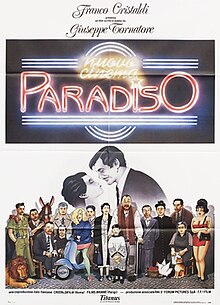
Back سينما باراديزو الجديدة Arabic سينما باراديزو الجديده ARZ Yeni kinoteatr "Paradiso" (film, 1988) Azerbaijani جننت سینماسی AZB Новы кінатэатр «Парадыза» Byelorussian Ново кино „Парадизо“ Bulgarian চিনেমা পারাদিজো Bengali/Bangla Cinema Paradiso Catalan سینەما پارادیسۆ CKB Bio Ráj Czech
| Cinema Paradiso | |
|---|---|
 Italian theatrical release poster by Cecco Cecchini | |
| Italian | Nuovo Cinema Paradiso |
| Directed by | Giuseppe Tornatore |
| Written by | Giuseppe Tornatore |
| Produced by |
|
| Starring | |
| Cinematography | Blasco Giurato |
| Edited by | Mario Morra |
| Music by | |
Production companies | |
| Distributed by | Titanus (Italy)[1] Ariane Distribution (France) |
Release date |
|
Running time | 155 minutes |
| Countries | Italy France |
| Language | Italian |
| Budget | US$5 million[2] |
| Box office | $36 million (US/France/Italy only) |
Cinema Paradiso (Italian: Nuovo Cinema Paradiso, Italian pronunciation: [ˈnwɔːvo ˈtʃiːnema paraˈdiːzo], literally "New Paradise Cinema") is a 1988 coming-of-age dramedy film written and directed by Giuseppe Tornatore.
Set in a small Sicilian town, the film centres on the friendship between a young boy and an aging projectionist who works at the titular movie theatre. This Italian-French co-production stars Philippe Noiret, Jacques Perrin, Leopoldo Trieste, Marco Leonardi, Agnese Nano and Salvatore Cascio. The film score was composed by Ennio Morricone and his son, Andrea, marking the beginning of a collaboration between Tornatore and Morricone that lasted until Morricone's death in 2020.
Credited with revitalizing Italy's film industry, Cinema Paradiso has been cited as one of the greatest films of all time, and a world cinema classic.[3] The ending is considered among the greatest endings in movie history. It was a commercial success, and won several awards, including the Academy Award for Best Foreign Language Film[4] and the Cannes Film Festival's Grand Prix. It was nominated for 11 BAFTA Awards and won five; including Best Actor for Philippe Noiret, Best Supporting Actor for Salvatore Cascio, Best Original Screenplay, and Best Foreign Language Film, a record for a foreign language feature until it was broken by All Quiet on the Western Front in 2023.
- ^ a b c d e "Nuovo Cinema Paradiso (1988)". Archivio del Cinema Italiano. Retrieved 11 July 2021.
- ^ Vancheri, Barabara (26 March 1990). "Foreign-movie nominees discuss money, muses". Pittsburgh Post-Gazette. p. 10.
- ^ Cite error: The named reference
:0was invoked but never defined (see the help page). - ^ "The 62nd Academy Awards (1990) Nominees and Winners". oscars.org. Retrieved 3 July 2021.